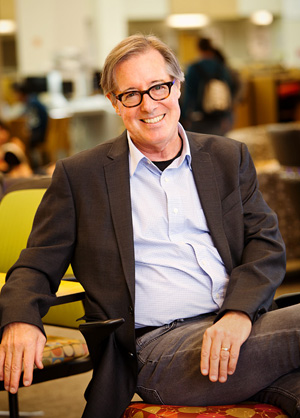Bruce Clarke
2012 Texas Tech Integrated Scholar
Horn Professor of Literature and Science,
Department of English,
College of Arts and Sciences
 The reach between literature and science is the longest kind of reach you can make
in academe . . . There is no pat formula for doing that . . . but if my work has any
effect on the globe in its own small way I would hope that it would assist in this
larger—essentially philosophical effort—to rethink the position of humanity.
The reach between literature and science is the longest kind of reach you can make
in academe . . . There is no pat formula for doing that . . . but if my work has any
effect on the globe in its own small way I would hope that it would assist in this
larger—essentially philosophical effort—to rethink the position of humanity.
Literature and its interconnections with science are central to the academic work of Horn Professor Bruce Clarke. He has spent more than two decades researching and teaching about this emerging area of literature, crafting his findings into scholarly articles as well as lectures. His commitment to the field recently brought to Texas Tech the Earth, Life & System Symposium—dedicated in honor of the late Professor Lynn Margulis, whose scholarship on cell biology shaped the study of evolution and made a deep impression on Clarke. Also, Clarke's service to his field and to the university have likewise been great. He has been president of the Society for Literature and Science and is interim chair of the English Department in the College of Arts & Sciences, in addition to appointments on administrative committees and as an editor of INTERTEXTS: a Journal of Comparative and Theoretical Reflection, which is published by TTU Press. In addition to his recognition as one of this year's Integrated Scholars, Clarke was named a Paul Whitfield Horn Professor in 2011. Prior to his career in academia, Clarke was a founding member of the pop band Sha Na Na during his days as an undergraduate at Columbia University.
Learn more about Integrated Scholar Bruce Clarke in this question-and-answer session.
What are your research objectives and interests?
As a scholar of literature and science I am committed to doing and promoting interdisciplinary and transdisciplinary research. For me, at the moment, this means investigating the history of cybernetics and systems theories in relation to literature and philosophy as well as to modern culture generally.
How do you feel your research impacts the globe?
With regard to the international world of intellectual discussion, I am doing what I can to join and advance certain important conversations. Their general import is to move academic institutions toward a vision of the posthumanities. For instance, this discussion would encourage us all to realize and act upon the understanding that the globe does not revolve around just human beings.
What types of service projects have you been involved with?
Ever since I was in high school, more often than not, I have been in some kind of rock'n'roll band. In recent years my local community service project has been called the Prophets of Rockabilly. Seriously, my academic service has always taken the form of professional service. For me this has involved a proactive interest in creating venues for scholarly discussion beyond the walls of the university. I have developed and directed national academic meetings, obtained the presidency of a national scholarly organization—the Society for Literature, Science, and the Arts—and edited scholarly journals and collections of essays. Last year a colleague and I developed a new book series at Fordham University Press, called Meaning Systems. My service projects open doors for others to advance in the profession.
What are you currently working on?
I am working away at two book projects. One is Systems Countercultures, a historical and cultural study of a particular line of developments in cybernetics and a particular group of systems thinkers that converged around the Whole Earth Catalog in the late 1960s and brought about major innovations in the 1970s. The other is Narrative, Media, Systems, a theoretical treatment of narrative forms in recent literature and cinema as they reflect new kinds of media technologies and communication systems. Additionally, teaching my latest literature and science class on "The Planetary Imagination" has me fired up to research and write about ecology. Finally, I am directing a symposium here at TTU this September that is very much in the spirit of this ecological interest: "Earth, Life & System: An Interdisciplinary Symposium on Environment and Evolution in honor of Lynn Margulis."
Where do you find your inspiration?
In my creative and intellectual heroes, such as the recently deceased evolutionary thinker Lynn Margulis.
What advice do you have for new faculty members about balancing the components of Integrated Scholarship—teaching, research, and service—in their careers?
Avoid administrative work entirely, or at least, to whatever extent and as long as possible.
Scholar Background
In becoming an English professor, I just followed my interests and academic talents. I never really imagined another sort of profession, but I did not think about the professional side of things until, at the end of my doctoral program, it became time to start my job search. After getting tenure at TTU, I followed a new interest and gradually shifted from the field of Romantic poetry to my current field, literature and science. This is nothing I would have foreseen, nor did I train for it in any dedicated way. Rather, it resulted from a fortunate convergence of certain inspiring colleagues and timely readings, and the institutional latitude TTU gave me to evolve beyond what it had originally hired me to do.
Office of the Provost
-
Address
104 Administration Building, Box 42019, Lubbock, Texas 79409-2019 -
Phone
806.742.2184 -
Email
provost.communications@ttu.edu
